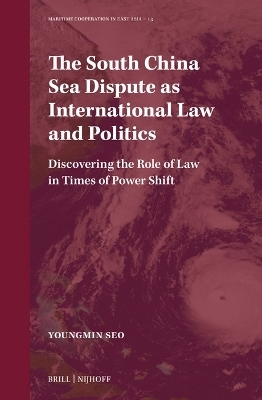
The South China Sea Dispute as International Law and Politics
Martinus Nijhoff (Verlag)
978-90-04-69634-1 (ISBN)
Digging deep into the fields of international law (IL) and international relations (IR) theory, this book offers a groundbreaking interdisciplinary exploration of legal solutions to the South China Sea dispute. Youngmin Seo navigates the complex terrain of the role of international law in times of power redistribution, presenting unique insights that redefine perspectives. Seamlessly blending IR and IL perspectives and providing a nuanced understanding of this global issue in the Indo-Pacific, this work is a beacon in turbulent waters.
Youngmin Seo, J.S.D. (U.C. Berkeley, 2021), has been practicing international law at the Korean Foreign Ministry since 2006. He has published numerous articles on interdisciplinary topics, focusing on the balance of power in law, the law of the sea, and the Indo-Pacific region.
Preface
Acknowledgements
List of Figures and Tables
Acronyms
1 The Facts and the Formal Law
1.1 The Facts and Recent Events
1.1.1 History of the Dispute
1.2 Recent Events
1.2.1 Naval Conflicts between the United States and China
1.2.2 Arbitration between the Philippines and China
1.2.3 Land Reclamation and Island-Building
1.3 International Law and the Resolution of the South China Sea Dispute
1.3.1 Territorial Sovereignty
1.4 Freedom of the Seas
1.5 The Legal Status of Geographic Features
1.6 Maritime Zones
1.7 Maritime Boundaries
1.8 Historic Rights Claim (The Nine-Dash Line)
1.9 Submerged Landmass and Island-Building
1.10 Dispute Settlement Mechanism
1.11 Structure of the Book
2 The South China Sea Dispute as Law-Fare
2.1 The Chinese Legal View
2.1.1 The Chinese View on the International Legal System
2.1.2 The Chinese View on the International Law of the Sea System
2.2 The Chinese View on the South China Sea Dispute
2.3 The Western Legal View
2.3.1 The Western View on the International Legal System
2.3.2 The Western View on the International Law of the Sea System
2.3.3 The Western View on the South China Sea Dispute
2.4 An Analysis of the South China Sea Lawfare
2.4.1 Is the International Law of the Sea International?
2.4.2 The Utility and Fertility of UNCLOS
2.4.3 The Growing Need to Clarify Core UNCLOS Regimes
3 The South China Sea Dispute from the Perspective of International Relations Theories
3.1 Research Programs in International Politics
3.1.1 Realism
3.1.2 Liberalism
3.1.3 Constructivism
3.2 China’s Intentions—China’s Goals and the South China Sea
3.2.1 Oil and Gas
3.2.2 Recovering Historical Regional Dominance
3.2.3 Fear of Containment
3.3 Security Seeking Purpose
3.4 Nationalism and Domestic Politics
3.5 Conclusion
3.6 Realist Evaluation of the South China Sea Dispute
3.6.1 Ominous Prediction of Balance-of-Power Politics
3.6.2 Power Transition Theory and the Inevitability of War
3.6.3 A Possible Way out from the Realist Perspective
3.7 Liberalist Evaluation of the South China Sea Dispute
3.7.1 Optimistic Prediction of Economic Interdependence, International Institutions, and Globalization
3.7.2 The South China Sea Dispute within the Current World Order
3.7.3 A Possible Way out from the Liberalist Perspective
3.8 Constructivist Evaluation of the South China Sea Dispute
3.8.1 Beliefs, Ideas, Identities, and the South China Sea Dispute
3.8.2 A Possible Way out from the Constructivist Perspective
3.9 Conclusion
4 What Should International Law Do for the South China Sea Dispute?
4.1 The Role of International Law in Times of Power Shift
4.1.1 Power in International Law
4.1.2 Power Shift Entailing Law Shift
4.1.3 The Condition and Process of the Law of the Sea Shift
4.2 The Mode of Power Shift Reflection in the Law of the Sea
4.2.1 US-Chinese Joint Declarations or Agreements
4.3 Modification under the Built-In UNCLOS Mechanism
4.4 Regime Creation for the South China Sea Dispute
4.5 The Propriety of Regime Creation in the South China Sea
4.6 Why Does Regime Creation Benefit China?
4.7 Soft-Law Regime Building: the South China Sea Council
4.8 Conclusion
Bibliography
Index
| Erscheinungsdatum | 09.04.2024 |
|---|---|
| Reihe/Serie | Maritime Cooperation in East Asia ; 13 |
| Sprache | englisch |
| Maße | 155 x 235 mm |
| Gewicht | 604 g |
| Themenwelt | Recht / Steuern ► EU / Internationales Recht |
| ISBN-10 | 90-04-69634-2 / 9004696342 |
| ISBN-13 | 978-90-04-69634-1 / 9789004696341 |
| Zustand | Neuware |
| Haben Sie eine Frage zum Produkt? |
aus dem Bereich


